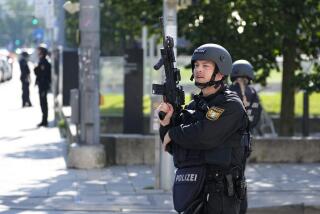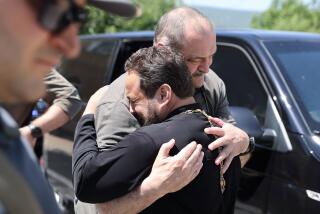Bus Attack Strikes at Heart of Russian Sense of Security
- Share via
MOSCOW — Security forces disclosed little about the masked gunman they overpowered and killed early Sunday during a hostage-taking incident near the Kremlin, but the latest in a string of terrorist attacks spoke volumes about the soaring vulnerability of Russians and foreign visitors.
The brazen seizure of a busload of South Korean tourists only yards from a main gate of the Kremlin sent an unmistakable message to Russian authorities and the public alike that no one is safe from the spiral of terror and retaliation fueled by the power struggles racking Russia.
Investigators for the Russian Federal Security Service--a domestic successor agency to the KGB--told journalists that they had not yet identified the sole gunman killed in a commando raid before dawn.
But leaked reports said he had recently entered Moscow from southern Russia, hinting at a possible connection to the 10-month-old war in the breakaway republic of Chechnya.
Chechen rebels driven to the brink of defeat have vowed to spread terror throughout Russia as long as troops continue to occupy their republic.
The most deadly of the recent hostage-taking incidents, in the southern Russian town of Budennovsk in June, cost at least 140 lives and exposed federal Interior Ministry forces as inept defenders of public security. Local police officers were later charged with granting the terrorists passage in return for bribes.
But the weekend’s stunning standoff was a sobering reminder of the dangers posed by the outrage of aggrieved peoples.
“When there is no workable crime-prevention system, people feel they can take hostages right in the heart of Russia, in Red Square!” lamented Gennady F. Khokhryakov, a department head at the Russian Law Academy in Moscow.
He warned that the weekend attack will have a chilling effect on already flagging tourism, but he called the “humiliation” for Russian domestic security an even more devastating blow.
While Muscovites have for the most part been exempt from the cycle of violence stemming from the conflict in Chechnya, the bus hijacking at the Kremlin’s doorstep painfully illustrated the failings of a notoriously corrupt police force and a poorly supplied army and security force.
In the weekend incident, the gunman forced a group of 27 South Koreans and their Russian driver and guide to position their bus on a main bridge over the Moscow River near the Kremlin.
A Federal Security Service communique said the hijacker demanded $10 million, a car to take him to Domodedovo Airport and a getaway plane.
No documents were found on the body of the slain gunman, who investigators described as being in his early 30s and recently arrived from southern Russia. Flights to the Caucasus regions originate from Domodedovo.
Troops of the Interior Ministry’s Alpha force stormed the bus just before 3 a.m., shooting dead the hijacker and freeing the last hostages unharmed.
More to Read
Sign up for Essential California
The most important California stories and recommendations in your inbox every morning.
You may occasionally receive promotional content from the Los Angeles Times.














